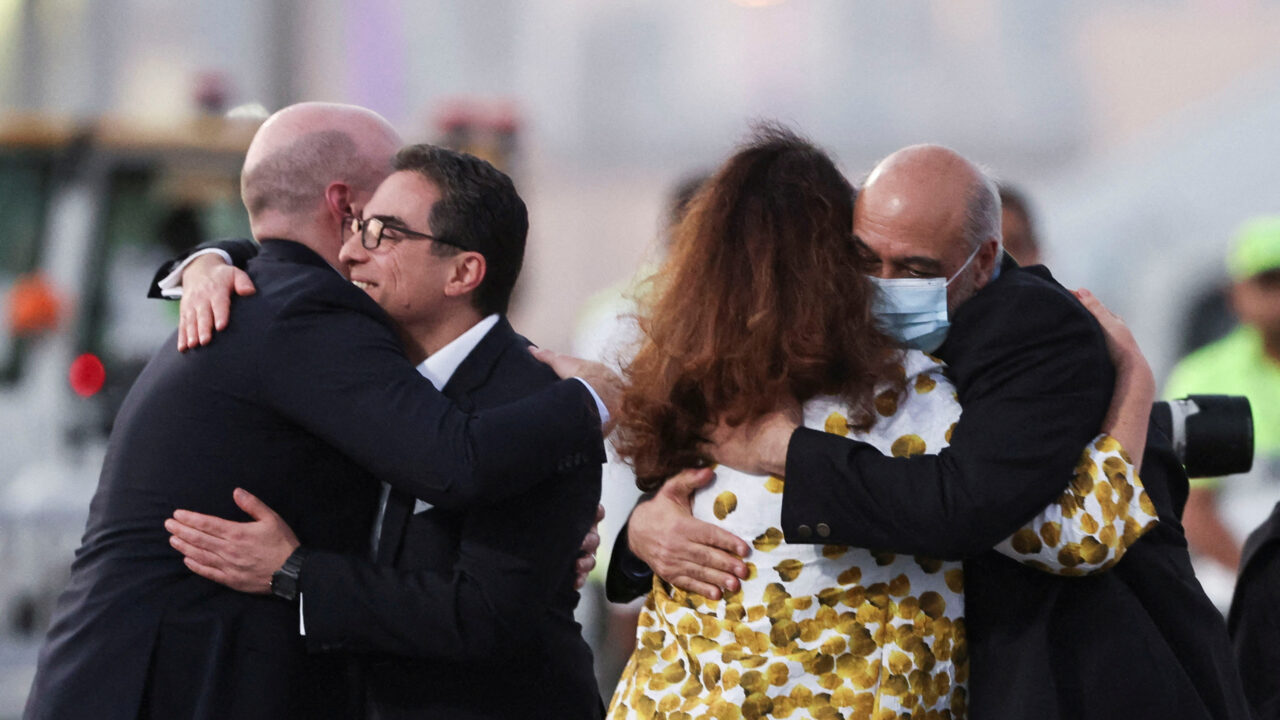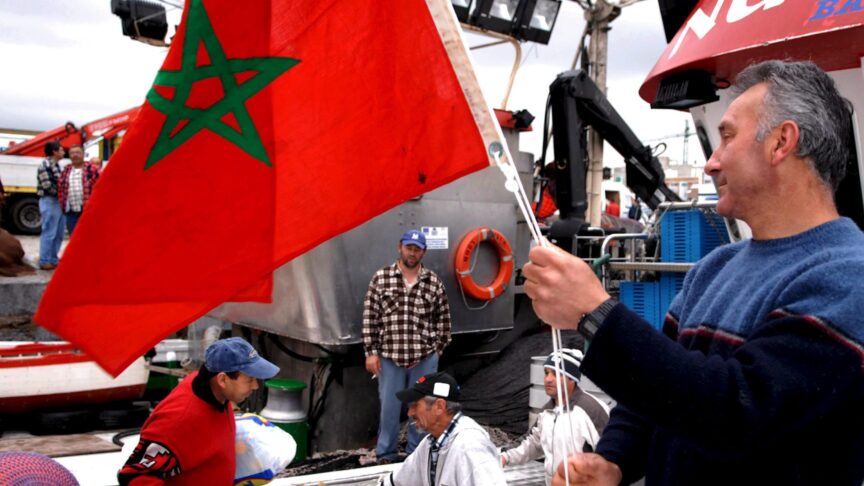Arbitrary detention: The US-Iranian prisoner swap as a catalyst for a new approach
The Biden administration has secured the release of five US citizens from unjust detention in Iran. European countries should now coordinate with the US to tackle the use of arbitrary detention as diplomatic leverage in Iran and beyond
After years of negotiations with Iran over successive US administrations, five American citizens unjustly detained by Iran are finally free. The release of the US citizens follows a series of similar agreements since 2022 between European governments and Iran to secure the freedom of British, French, Belgian, Danish, and Austrian detainees.
Yet, many Western citizens remain victims of Iranian authorities’ efforts to gain diplomatic leverage through arbitrary detention. In early September 2023, for example, news emerged of a Swedish EU diplomat who has been imprisoned in Iran for over a year. In June, the Belgian government stated that 22 Europeans remain in Iranian prisons.
Iran is among the worst offenders in using people as diplomatic pawns in recent years. But state hostage taking is on the rise globally, including in China, North Korea, Russia, and Venezuela. Western governments are, in turn, increasingly having to undertake unsavoury diplomacy and make unpalatable compromises to secure the release of wrongfully detained citizens.
European countries should now help to shape a strategy to combat the use of this tactic worldwide. They should prioritise finding ways to secure the release of other innocent detainees in Iran. Doing so will require continued pragmatism about the importance of undertaking hostage diplomacy and coordinating more closely with the United States, which frequently possesses the greatest leverage over the states in question.
The latest US-Iran deal
The Biden administration secured the release of the US citizens held in Iran by conducting a prisoner swap, as well as granting Iran access to $6 billion of its own money to use for humanitarian trade via Qatari banks. By striking this deal, US president Joe Biden and his administration have shown the same pragmatism as European governments in previous agreements. But the deal has come at a political cost – with Biden’s critics implying that he had eased sanctions pressure on Iran.
Brett McGurk, the US National Security Council coordinator for the Middle East and North Africa, has refuted suggestions that the US made a “ransom payment” to secure the release of the detainees. Indeed, even the Trump administration seemingly conceded that Western governments need to leverage Iran’s pressing needs for humanitarian imports in the course of hostage diplomacy.
For example, in December 2019, American student Xiyue Wang was freed in a prisoner swap with Iran mediated by the Swiss government. The following month, the Trump administration launched the Swiss Humanitarian Trade Arrangement (SHTA) to facilitate humanitarian transactions that his “maximum pressure” sanctions campaign against Iran had impeded. In June 2020 another US detainee, Michael White, was freed from Iran. In July 2020, the SHTA processed its first transaction, allowing Iran to use its frozen reserves to buy food and medicine.
The arrangement the Biden administration has established in recent days works in broadly the same way: dubbed by the US as the “humanitarian channel in Qatar”. Iran accumulated the money in question through oil sales to South Korea when this was permitted by the easing of US sanctions following the 2015 nuclear deal. Payments for these exports landed in Korean banks, which then stopped processing all Iran-related transactions in November 2018 when the Trump administration reimposed secondary sanctions on Iran.
Under US regulations, Iran has always been permitted to use its oil funds held abroad for humanitarian trade. But, in the context of “maximum pressure”, South Korean banks refused to process transactions without explicit guidance from the US government, leaving the funds effectively frozen.
In recent weeks, the US Treasury provided the necessary waiver, enabling the transfer of the funds from two South Korean banks to two banks in Qatar. Iran’s access to these funds will remain tightly controlled. US secretary of state, Antony Blinken, has emphasised that “Iran will not be receiving any sanctions relief” and that the funds transferred to Iran “can only be used for humanitarian purposes”. The Treasury Department will be able to check every transaction before payments are made, and the money released will likely cover just seven months of Iran’s humanitarian import needs.
The Treasury Department will be able to check every transaction before payments are made, and the money released will likely cover just seven months of Iran’s humanitarian import needs.
When Iran has transparent avenues to purchase humanitarian goods, it presses Iranian authorities to deliver what their people need. It disarms them from the argument that Western sanctions are to blame for a lack of access to food and life-saving necessities. Moreover, Iran’s central bank governor has stated that Iran can only use the funds for the purchase of “non-sanctioned goods”. The deal is therefore not a financial gamechanger for Iran: no money is flowing into Iran’s financial system, and US sanctions will continue to hit government revenues.
A new Western strategy
Upon his release this week, Siamak Namazi, one of the longest held US detainees in Iran, called for a “game-changing global endeavour” to address adversary states using Western citizens as bargaining chips. As he – and the details of the latest deal – imply, there are no easy solutions. But Western governments can increase their respective leverage in negotiations with Iran and beyond through a more coordinated approach.
Firstly, Western policymakers need to be proactive in formulating an enhanced multilateral approach towards arbitrary detention in state-to-state relations. The Declaration Against Arbitrary Detention in State-to-State Relations, introduced by Canada, now has over 70 signatories, and provides a good basis to intensify intergovernmental talks over such coordination.
In relation to Iran, this could help European countries and the US present a more unified negotiation stance and prevent Tehran’s picking and dividing of Western governments on detainee issues. They could, for example, aim to formulate a collective deal to release all Western detainees deemed to be wrongfully detained in the country. This effort should involve civil society actors, former detainees, and the families of current detainees in devising a best practice approach.
Secondly, states such as Iran should face specific repercussions for their use of arbitrary detention as diplomatic coercion. This could involve new multilateral sanctions frameworks that specifically expose and target those involved in arbitrary detentions. For instance, rather than address detentions under existing human rights sanctions, Western governments could draw on the United States’ Robert Levinson Hostage Recovery and Hostage-Taking Accountability Act for a more specific framework. In parallel, Western countries need to maintain a spotlight on offending states’ domestic human rights abuses and continue to take tangible measures to support citizens within these countries.
Thirdly, governments should consider initiating legal proceedings against the offending states at the International Court of Justice, which could be linked to the denial of Consular access pursuant to the Vienna Convention.
In parallel to this, Western governments should continue to use diplomatic tools to proactively de-escalate tensions with Iran and other relevant countries across a range of issues, which could in turn reduce the risk of future arbitrary detentions.
An asymmetry exists between Iran and the US: the US can cause real pain to the Iranian economy, but Iran is unable to reciprocate. As long as the US continues to use sanctions to cripple the Iranian economy, hardline actors in Iran will likely seek to enhance their position by abhorrently using Western detainees as bargaining chips. Reaching a deal for de-escalation will not be easy. But, without one, Western governments will not be able to escape this cycle.
Western states should seize the political momentum that is currently under way. The release of the five Americans is part of a positive trend in which diplomacy undertaken by multiple countries has led to deals with Iran. The US and Iran have also seemingly entered a de-facto state of deconfliction in Syria and Iraq – where their forces have not clashed since March. According to the International Atomic Energy Agency, Iran has slowed its accumulation of 60 per cent enriched uranium, which is an important political signal given alarming recent advances in Iran’s nuclear program.
Western governments should view the UN General Assembly this week as a platform for continued de-escalation. The homecoming of the five Americans is a reminder of what principled diplomacy can achieve, but also of the need to place more pressure and accountability on states that arbitrarily detain Western citizens as diplomatic pawns.
The European Council on Foreign Relations does not take collective positions. ECFR publications only represent the views of their individual authors.



